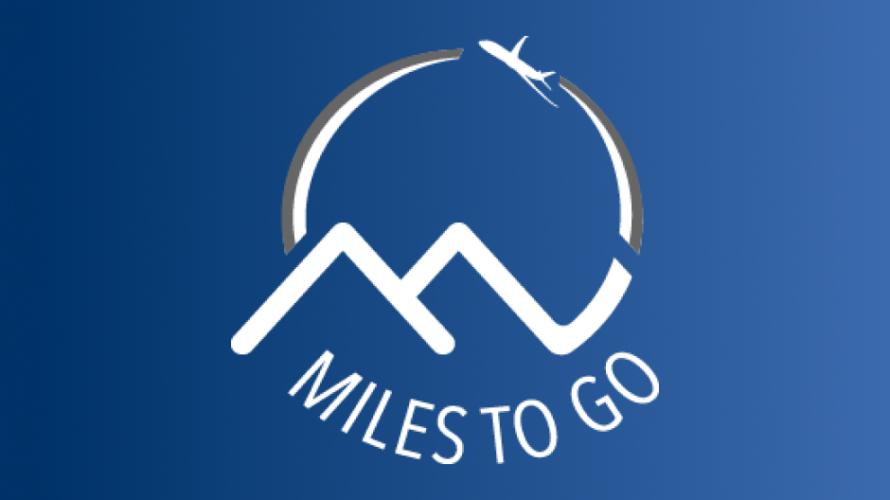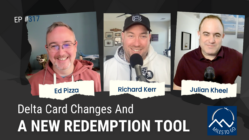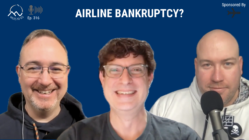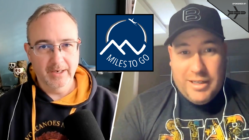Announcer: This week's episode of the Miles to Go Podcast is brought to you by the new Wyndham Rewards Earner Cards designed with road trippers and road warriors in mind, apply today, and you can earn up to 45,000 bonus points enough for up to six free nights at thousands of hotels by Wyndham around the world, whether it's the no-fee Wyndham Rewards Earner Card, the $75 annual fee earner plus card, or the $95 annual fee earner business card, Wyndham Rewards has a card that's right for you. Plus with up to eight X points on eligible hotel stays and purchases up to five X points on marketing, advertising, utilities purchases with the earner business card and up to four X points on restaurant and grocery purchases, your neck gateway could be closer than you think. Earn like you mean it every day and get to free nights faster with the Wyndham Rewards Earner Cards, terms and conditions apply. Learn more at wyndhamrewardscreditcard.com.
Speaker 2: You're listening to the Miles to Go Podcast, the go-to source for travel tips, news, and reviews you kind of want to miss. Now here's your host travel expert Ed Pizza.
Ed Pizza: Welcome back to the Miles to Go Podcast. We've done a lot of talking about COVID-19 and travel and how those two things are definitely like oil and vinegar right now, but in fits and starts travel is getting restarted. Maybe that's a good thing. Maybe it's a bad thing. It depends on what your opinion is, but I wanted to break down some of the new changes and Gilbert from God Save the Points has been writing about a few of them that both make me excited and give me pause at the same time. Gilbert, welcome back to the show, man.
Gilbert Ott: Hello Edward, how are you?
Ed Pizza: I'm nervous if I'm being honest, because I see some of the stuff that's coming out and it makes me excited, but I'm also nervous that maybe we're just not quite ready, especially, we're recording this a couple of days before it drops live, but sort of waking up to the news that essentially the world sort of shut down travel from the UK because of a new strain of the virus last night, while we're spinning up, COVID free flights around the world. How are you?
Gilbert Ott: Yeah, on that news, it's been an interesting morning to wake up in the UK and fall asleep in the UK. I think obviously all of these things are important and should be discussed and countries are probably right to limit their exposure for now. But as we know with pretty much every virus in the history of the world, they do tend to mutate and not necessarily actually in bad ways, the mutations typically mean they spread easier, but they become less deadly. That's always been the guidance on viruses and pandemics. So until they can confirm that, take all the precautions, but I think people just need to take this with a grain of salt and that things do happen. Things do change, and it's not like this wasn't expected at some point. So I'm like you, I'm a little bit apprehensive. I'm going to probably give it a pass, the whole travel thing for a little bit, just for a month or two until we know where the world's definitely going. But yeah, I think that cautiously optimistic is how I'm feeling.
Ed Pizza: Yeah. And I think, when we're looking at the landscape now you've been writing about a couple of things that I find really interesting because-
Gilbert Ott: Me.
Ed Pizza: I know.
Gilbert Ott: Things that I wrote.
Ed Pizza: I know. Well maybe somebody wrote them for you to be clear.
Gilbert Ott: True.
Ed Pizza: But let's start with the Delta quarantined free flights. So the quick tip off here is Delta spun up some flights to some desirable destinations that you can avoid quarantine on, which is certainly a rarity for folks from the U.S. right now. Give us the low down on what this actually looks like in reality.
Gilbert Ott: Yeah. So I'll start with the buzz kill. The buzz kill is that it doesn't mean that you, the American without relationships in Europe or business in Europe can just hop on one of these quarantine flights and go. The existing entry rules still apply so you need to have a EU passport or immediate family member, et cetera. You can look that stuff up. So that's the buzzkill. The cool bit of it is that Delta has effectively partnered with the airports and the cities involved. And I guess on some level, the national government's involved to say, look, we've got these testing elements that we think are so secure. And the Mayo Clinic agrees are so secure that the believed percentage is one in a million that somebody going through these hoops is going to end up catching or spreading COVID or testing positive days later that was sick on the plane, is the basis of it.
So there's three layers of testing. There's a test 72 hours before departure, which is pretty standard for a lot of countries right now. Like if you want to go to The Maldives, South Africa, et cetera, that's pretty much what you're looking at. Then Delta is putting its money where its mouth is. They're actually paying for these rapid airport tests that you take right before boarding, which is the second level. So that's making sure that just in case something slipped through the cracks on the first test, And then, two hours ago, it should be caught on the next test. Then when these people are landing in any of the given countries, they're then being tested again, also with the rapid test results delivered in minutes, why can't everyone be like this?
So that's the third level. So even if somebody happened to slip through on departure and then nine hours later landing and in Rome or Amsterdam, which are the two cities that are participating, they'll have another test. And if they're negative, scientifically the Mayo Clinic based on all these examples and case studies, they've done believes that the odds are one in a million and that's good enough for most people because I've been in lots of things where I've entered and there've been a million other entries, and I haven't ever won one.
Ed Pizza: I actually wrote that down as a note, when we were going to record was that somehow the one in a million is going to end up in our title. I don't want to be Debbie Downer. I mean, it's the Mayo Clinic, there's lots of great science here, but one in a million still seems odd to me to chalk the results up that high and that, if I'm taking a PCR test 72 hours prior to departure, I've got three days to go get infected from someone. And if it's right at that 72 hour window, I probably have enough viral load to fail the rapid test.
But we've been using the rapid test for our employees. And there is a failure rate of, I don't know, five or 6%. And I mean, there are recent reports, again, not trying to be Debbie Downer, but there was the flight to New Zealand recently where they, they broke down contact tracing and there was some spread on the plane. So, is it a one in a million chance that I could take my PCR test, go hang out at a bar with friends and get on the plane and not have COVID? It feels like a little bit of a reach to me from a numbers standpoint.
Gilbert Ott: I feel like that's where the third test matters because you're talking about a significant transatlantic flight, especially, if let's say they take the rapid test two hours before they actually board the plane at check-in, then they've got two hours before the flight leaves, plus the seven for the flight itself, that's nine. Then by the time they get off the plane, let's call it 10. So again, I'm not a scientist. I agree, there's definitely some error margin here. And I think they are assuming that people aren't trying to go out and catch it in between. And I guess that's where I find myself incredibly frustrated in the world we live in, which is if I'm traveling somewhere and I got away three times this year, I went to New York in May on some essential travel. I wouldn't have traveled if I didn't need to. I went to Greece in August for leisure, with my family. And then I went to New York and LA in October.
For me, the week leading up to those flights, I'm treating them like my whole life must be secure. I'm not going out. I'm not mingling with friends. I'm not seeing people indoors because I feel this responsibility of, okay, I need to be part of the solution, not part of the problem. So I'm going to limit my contact as much as possible in the seven days for the benefit of myself, for those even flying with me and for the people I may see on the other side, but it just doesn't seem to be the case.
I saw those people on the San Francisco, Hawaii flight who tested positive, then tried to get on the plane because they still wanted to have their vacation. And this context is just driving me nuts of how selfish people are. I think that's where I'm at my wits end because, because all these travel companies aren't idiots, they know that if somebody were to test positive, it would mess up their plans, blah, blah, blah. But that's why they're offering flexible cancellation policies, refunds. They have these things in place of, we'll still make it work for you at another time. We're very sorry, but we're not going to risk everyone's safety just for the sake of your getaway. And the fact that people are still trying to go around that makes my faith in humanity, which was already tested, has been tested some more.
Ed Pizza: Yeah. And again, not trying to [inaudible 00:09:46], but a couple other things here, I'd say, first off I don't disagree that there's more of a chance that you get... Caught is the wrong word, but either you test positive by adding that third test when you land. But I think the other side of it, I say two things, first off, if you test positive upon landing, that's obviously didn't prevent spread on the plane. So you're still-
Gilbert Ott: You bring me to a great point, actually. Thank you. Which is part of it, which is how they got to their one in a million, because I agree shaky ground purely on the testing. They get to the one in a million based off of Delta's 60% loads, which they're maintaining through the spring. So whereas other airlines are taking as many passengers as they can get Delta's sticking with this plane, 60% full thing. So I think the idea is that based on how unlikely it is to spread for people who do have some level of distance, they're adding that in as a factor of less time in close contact, the Delta hygiene standards or whatever, with the care kits and bathroom cleaning protocols, whatever. I think that's how they got that number higher.
Does that take it all the way? I don't know. Again, I'm not a epidemiologist, I have not studied transmission on planes in a lab level. I've read lots of lab reports. So I think that's their thing is they're saying based on those tests and deltas agreeing to basically leave every middle seat blocked so that no one's sitting next to each other. That's where that extra factor comes in.
Ed Pizza: Yeah. And I'm sure that adds points to it. No question. I mean, as a lot of the listeners know, my day job is running restaurants and we haven't had any in restaurant transmission yet, but we've had plenty of cases of folks who've gotten ill outside of it. And we've had a number of folks who their spouse or significant other test positive or have symptoms and they're sharing a house. And by the time the spouse starts exhibiting symptoms, they start isolating, don't share a bathroom, don't share kitchen, stuff like that, but we've seen symptoms pop up in that five to seven day window after the spouse has their first symptoms.
So I look at the window and it makes me a bit nervous. I mean, now that we have editorialized, like we would always do up to this point, but you had an interesting comment right before we got into recording at least on this part of what we're discussing today, it feels like... Love to see all the pieces in place and love to see airlines and countries trying to find ways for people to travel safely. It, it feels like this is a bit premature.
Gilbert Ott: Yeah. It's really interesting because every country is trying to get it right, every territory is trying to get it right. So Hawaii, they went with the single pre-flight test in hopes that would be enough. They were looking to weed out numbers that would be one in a thousand people could theoretically take the preflight test, test negative, and then still be incubating the virus and get sick. That number seems to have held. In fact, it was a bit better at one point. But for places with limited healthcare facilities, that's still not good enough. Kauai wanted out because they have, I think something like 12 ICU beds, total or something. So if you have 12,000 people, one in a thousand still isn't good enough.
So it's an interesting time. And I think there's just so much more pressure and responsibility on the traveler, in these kinds of ethical dilemmas of figuring out where you're going to go and how you're going to do it. So when I went to inaudible this summer, I was staying in a Villa, there was no one else, food came to me and was left at my doorstep. So I didn't see anyone, I wasn't too worried about my impact. If I'm trying to go and have the city break right now, it's not going to be the same city. We live near London and it's not London right now. You know, there, there are no pubs, there are no restaurants, there are no idiots on double decker buses snapping photos, it's just a different place.
So I think it does seem a bit premature, especially now that we're getting these vaccines rolled out. My whole thing has been we're going to have to learn to live with this virus on some level. So over the summer and in the fall, when things seem to be unfortunately not great, but at a statically not great level, I traveled because I wanted to see, okay, can we do this safely? Can the world keep going? Can commerce resume? Can face-to-face meetings happen? And it didn't seem that bad, but that was because there was no solution at that point, in my opinion.
Now we've got these vaccines, which were approved, they're being rolled out, they're being shipped, they're already on United flights and lots of other airlines. And I'm thinking to myself like, okay, my dad's in his late seventies, wouldn't my dad's age and all these most at risk people are critically mass vaccinated then I'll start to think about it again. So I've moved all my trips to late spring basically, and all the ones that I really want to be amazing. And I kind of secretly wish I won't have to wear a mask for I've moved to November.
Ed Pizza: Yeah. And I think that's probably a safe bet. For truly safe travel, it's probably something that looks like summer or fall before you can say that they'll definitely be enough doses and people lining up to get the vaccine where numbers should be truly, incredibly minimal that you wouldn't be nervous without asking.
Gilbert Ott: Yeah. And people kind of fail to consider this. I'm not so much personally worried about myself. I'm 33. I keep as fit as I can, but I'm very worried about what I could do to somebody else. And that's the whole thing. So I think that's been missing in this courtesy thing. People are like, "Well, what does it matter if I get it?" What matters is, if you get it, then you give it to somebody who isn't as fortunate as you. And then it's all a big disaster.
Ed Pizza: crosstalk You're still wet behind the ears, man.
Gilbert Ott: I feel very old for what it's worth.
Ed Pizza: Get off my lawn.
Gilbert Ott: But yeah, I'm just putting the brakes on things. I didn't expect that I would do that, but now that we're close and the UK is in meltdown and Brexit is happening and the United States has its own significant and almost comically sad satire of politics going on, whatever else. I think I'm just going to lay low for a little bit, let better news roll in and then try to just hop on that wave of positivity and see where it takes us.
Ed Pizza: I kind of feel like we've been saying Brexit's been happening for like two years, so I'm a little skeptical there. But I think you bring up-
Gilbert Ott: The people would love it if that skepticism came to reality right now.
Ed Pizza: I know.
Gilbert Ott: It's not looking good for anyone who's paying attention.
Ed Pizza: I think the point that you bring up and I think is a great place to put a bow on it and then I want to touch a bit on countries that you can get into now. When we look at the landscape, it feels close. You see vaccines rolling out and trucks around the U.S. and obviously the UK approved vaccine a week before the U.S. did. This is happening. And so it feels like as crappy as it's been to be essentially locked inside for eight or nine months now that we can see a horizon and there won't be a finish line. There's still going to be nervousness.
Gilbert Ott: Totally.
Ed Pizza: inaudible and stuff like that. But it feels like they'll be a noticeable reduction in risk by the time it starts getting warm in the Northern hemisphere again.
Gilbert Ott: Exactly. And you tell me we can do eight, we can do 12, and I feel like it's a small price for everybody to pay for, hopefully a much better second half of the year. I For me personally, I think that anyone who dies between now and vaccine rollout, it's particularly sad. Not that everyone isn't sad, but knowing that there's actually a solution now, which if everybody did their part could save people, I think it makes it even worse.
Ed Pizza: Yeah, which I think, is all the more reason to say, "Hey, like let's buck up and try and get over the hump." And not that, if the math is right, that there's a one in a million shot that you could get on these flights and not catch COVID.
Gilbert Ott: I think if people do feel like traveling, do it just be responsible, just be the person you would want to be if you were immunocompromised or however you say it and needed to survive this, be the neighbor that you would hope for that person.
Ed Pizza: Yeah. I think that's a great point at which if you do have to go out and travel, make sure you're staying away from everyone, truly quarantine for, for two weeks. That's not the end of the world.
Gilbert Ott: No, it's not fun, but it's not the end of the world.
Ed Pizza: All right. Well, I want to touch on countries that are letting folks in, but I'm going to take a quick pause real quick so we can thank our sponsors for this week.
Announcer: As you guys heard at the top of the show, the folks over at Barclays and Wyndham are sponsoring the show this week as part of their launch of the new Wyndham earner credit cards. My main focus is the small business card that they have, where I can earn eight points per dollar on gas purchases and five points per dollar on things like marketing expenses and a category that's pretty unique for credit cards, which is utilities. They are the personal versions of the card, I think are also great values. They'll pay for themselves pretty easily as well. If you didn't hear, the folks from Wyndham rewards are also giving away to 10 lucky listeners of the show, free diamond status for a year and 15,000 Wyndham rewards points. Look for links for all of that in the show notes.
Ed Pizza: Okay. So there are actually some countries letting people in, and while it's a little bit gray to me in terms of how you prove that you had COVID, if you can prove you had COVID and that you don't have it anymore, there are actually some places that you can go right now.
Gilbert Ott: This feels kind of like our one in a million conversation earlier, where obviously there's some level of debate around how long immunity lasts. Is it actually immunity so forth? It seems that if you had a significant case, it's more significant immunity than not, whatever, we'll leave that to the scientists. But a lot of scientists do seem to think that there is a level of immunity of some kind in a meaningful way, enough, at least that countries are now starting to let people in based on the fact that they've had COVID and that is the primary concern. They don't care where you're from. They just care that you had COVID and no longer have it. And if you can prove that, they're willing to let you in quarantine free. Hungary, and Iceland are the first two to do that. And it sounds like some others are kind of gearing up as soon as they can get some more scientific consensus.
Ed Pizza: We just talked about how vaccines are coming and things are changing and counts are coming down.b I do wonder how many countries are going to go down this path. Because obviously there's a gap in time here and five or six months to a country that's a tourism destination, especially a place like Iceland, five or six months is an eternity. So I totally understand why they need to get something like this ramped up as quickly as possible. Obviously still some level of risk or some level of cost. But if a country knows that the vaccines are getting rid of the problem, if you will, I wonder how many countries take this next step and say, "Let's have a process. Let's set up this process for people who have test negative for the disease today, but can prove they had it before." Like, is it worth it for countries if they can see a potential finish line?
Gilbert Ott: I think it is because I think that some sort of finish line, whether it's that you've had it or that you've been vaccinated will matter for longer than we might care to hope. Just like some countries that require proof of yellow fever vaccination, things like that. I think that many countries will, going forward, either request proof of vaccination or proof of a previous positive result and current negative result. It seems inevitably the case so much so that lots of airlines and the world economic forum and a few different competing entities are all basically attempting to make a app, digital passport where companies can upload your records. It raises all sorts of privacy concerns and all this added pressure, but that definitely seems to be the way things are going like it or not.
Ed Pizza: I think you bring up a good point, one that I hadn't considered. That this is probably part of a strategy to address what things look like going forward, not just a one-stop shop for folks getting in but if I take aside my initial skepticism on it, I think when you combine this with some of the efforts that the Delta is putting out there, and they're not the only ones. Obviously we talked about the Hawaii thing, it feels like there are pieces of the puzzle coming together, sort of tie this all together where... I kept using the word normal in air quotes and I'm going to do it again.
Where we can travel like normal people again, without the fear of getting sick or without having to wear a mask for a 10 hour flight sleeping with a mask, all that stuff. It feels like I can see a path where I'm going to be able to start booking trips again. I mean, you said you've already booked some, which I think is great. I'm not there yet. Not because I'm scared of booking something. It's more just without more certainty, I don't want to start setting dates in place and then have to keep changing stuff, if that makes sense.
Gilbert Ott: You know better than I do is that points and miles are so cool with that. The trip I booked in October is to Japan. I used miles. I tried to change it the other day and it was such a long hold they waived the change fee for me, lots of mileage inaudible fees right now, if you inaudible whatever. So basically, I'm able to throw things that aren't going to financially impact me at potentially exciting future plans and that makes me happy. The idea of flying, in a nice comfy bed to Japan at the end of the year, perhaps not even having to wear a mask or if I do wearing it, but not worrying so much about the risks for me, really nice. It's a nice thought and if it gets canceled, then I get my miles back. It's not the end of the day. So that's where I am. That's why I'm doing it. And I like to have positive thoughts on the horizon, especially while we're all just kind of stuck in our houses. And mine's not very big so there are only so many rooms I can pace in.
Ed Pizza: Yeah. And as you mentioned, this is the great thing about points in miles, though. There is unbelievable unparalleled flexibility in paid fares right now too including all the airlines probably about two weeks ago, three weeks ago, essentially, at least the big U.S. airlines sort of getting rid of international change fees, which is something I haven't seen in my lifetime. So definitely unparalleled flexibility. I think where my head is, at least right now is more just... And maybe it's because I do have other options, although I can't say that they're my favorite. There's that big honkin RV and pickup truck in my driveway that the kids absolutely love and which drives me crazy. But I feel like there are enough places.
Gilbert Ott: All the anxiety in the world for me, I think I would rather be locked in my house forever with baked beans than have to go in an RV anywhere.
Ed Pizza: Yeah, it's interesting. But it does give us some ability to explore and we've always said we were going to explore the U.S. and then we just end up in Sydney or Auckland or Tokyo or wherever. So, I mean, there is some validity, I think that's my path right now, why I'm not jumping on other travel. It's just because I feel like there are places that I can go.
Gilbert Ott: I do think that's a great point. If there's any side positive by-product of all this is that people who have learned that there is so much in the countries they live in, that's been overlooked forever. Whether it's the UK people forget how amazing the drastic coast is the Lake district, the isle of Skye, whatever. There's so much that people just always say, end up dreaming of something more exotic only to figure out that some of the most exotic things in the world are a drive away or a train ride away, whatever it may be. So power to you. I respect it. I was in a band once and spent lots of time in a bus and vowed never to do it again.
Ed Pizza: Yeah. And you didn't even have to dump the Blackwater tank on the bus. Somebody else was doing that. You being a big music star and all that. All right. So I'm going to give you one last bite of the Apple before we run away. And I'm going to remind you because I love you so dearly that, that in the history of the podcast, we have never had the explicit lyrics tag on Apple podcasts. It's a great way to make the downloads go way, way down. So keeping that in mind, I do want to pick your brain-
Gilbert Ott: 2020 is the full of firsts, then. It might be time for one more.
Ed Pizza: Well, I've got the beeper at inaudible if you go off track here, but I want to touch on your recent story that you wrote about the Amex card shutdowns, for folks who were playing fast and loose with the rules and got their accounts shut down. Obviously, something I've known a lot about as well, we know folks that do this stuff on an ongoing basis, and it seems like the credit card companies are finally getting serious about shutting these folks down.
Gilbert Ott: Yeah. I mean, I definitely did not make many friends when that article came out.
Ed Pizza: He didn't have any to start.
Gilbert Ott: Yeah, which is fine because I had two and as you say, I pay them. So that's all good. They've got to stay. But it's one of these things where I'm all for making the most of points, earning opportunities, that's why we pay rent with a credit card when possible or car payments or if we can justify the fee to pay some tax bills, whatever it may be, put it on the card, use it, it's cash, but earn the rewards always at the best optimal earning rates. It's a wonderful thing because in my opinion, points naturally democratizes travel. I think I said in the article, it makes this unbelievable world where somebody who makes very minimal money working behind the counter as a barrista can fly in the same cabin as a Saudi Prince or something like that.
That's pretty cool to be able to have that experience and take somebody with limited income where they would never, ever be able afford to pay cash for the experience, but because they're savvy with their spending and their rewards and maximizing great credit card sign up bonuses that they're able to have these experiences, which are extraordinary and fit for princes and princesses and all this stuff. So my opinion is that I love points. I love the opportunities to earn them, but again, kind of like we were saying with this ethical, moral compass stuff with COVID, people just go off the deep end and the problem is that when a subset of people, however small it may be, get under the bonnet and start really frustrating loyalty program managers, we all suffer because it means that the program start pulling out great values.
They start trying to penalize these people, which then starts this kind of tit for tat to valuation. And it just got to the point where like... People are surprised to learn that I don't really do any manufactured spending. I probably earn, I don't know, 75,000 points a year or a hundred thousand points a year through my normal spending with the two X and the three X and five X categories, whatever, something like that. And I start looking at these values over the years as they go up. And of course, some of it is just the programs being greedy, there is an element of that. I'm not going to deny that, but a lot of it is caused by people who like we were talking about offline got 19 American airlines, credit cards and the name of them, their dog, their cousin's dog, their dead uncle. And technically it wasn't against the rules, but come on.
Does anyone actually think that American airlines wanted your dog to have a credit card and that's why they gave a hundred thousand miles? And of course there are more devious ways, which is what happened in the Amex PayPal key shutdowns, but it makes my head spin. I'm actually quite happy to see Amex and some of these... I saw Walmart the other day did the same thing like start to take notice because it's getting to the point where the points game was becoming irrelevant, because you could never earn enough points to actually get something great. It was just funny because it's become more popular than ever yet it was actually becoming as irrelevant as it was in the beginning because everyone just assumed they'd never be able to earn enough.
Ed Pizza: I still think there's a way for folks to earn plenty of points. I mean, you made the point that you're only earning 75,000, a hundred thousand points a year. First off, that's not an insignificant sum. It certainly depends on the currency, but I think if you work at it and you're still a good customer, I still think there's a way to earn lots of points,
Gilbert Ott: For sure. For sure. I mean, God bless America. We get these huge credit card bonuses that the rest of the world, for example, is super jealous of. The UK, the biggest ever credit card bonus we ever see. And this will grab headlines for weeks is 30,000 points of an airline currency, not even of Amex membership rewards or something like that. The U.S. it's not outrageous to get a hundred thousand, sometimes even 200,000. There are these unbelievable opportunities, which, like I said, naturally, democratized travel. It just doesn't mean you can do it every day. Like if the person working behind the counter at Starbucks could fly at first class every day, the world would be a very different place.
Ed Pizza: I love that we have God Save the Points dropping God bless America, that will be another sound bite that I'll have to cut out of the show and use repeatedly in memes for forever and ever. But I'm going to fold in my final two pennies right here and say, when I think about you using your example of like having 19 Citi American airlines cards, it's like we have a local pizza place and a local Chinese food restaurant that we've patronized for a decade or two in the area where I live. We know the owners and all that stuff. I mean, they make profit off of us. But when we go in periodically, sometimes I'll get a free order of egg rolls or the guy who owns a pizza place will give my kids a free soda.
There's a relationship there and there's other loyalty stuff and all that, but I don't have an expectation that I'm going to get my next 19 pizzas free from him. I mean, there's a great relationship and there's a benefit for it, but there's two sides to that relationship. And I think we've thought about credit cards in these relationships for a while, sort of like the big faceless company and it's just points and they can handle it and it's really not hurting anyone. And I think the reason why I wanted to discuss your article was because I think you really summed up well, who is hurting, it's hurting the other customers that spend in a normal way because the airlines and the banks are all going to find a way to remain profitable.
They're publicly held companies. They're going to figure it out. And frequently when folks ask me questions, I put in the podcast, stuff like that about cards to get and stuff like that, I always frame it up in terms of not necessarily what the signup bonus is for a card, because I think that's important. No question, sign up bonuses are important and they're huge in the U.S. right now and have been for a while. So they're definitely a big part of your strategy, but I also say, what are you going to use this card for after? Because if we're being responsible and and we're being good customers, because we want the long-term payoff.
It's like, all right, well, what are the ongoing benefits? Yes, sure. There are cards you're going to get, you're going to sign up for that. Maybe there's a reasonable chance you're not going to keep after the first year, but I think you should at least go into it saying, "I'm considering this product for the future." And for folks who don't do it that way, I'm not going to sit here and laugh or poke fun. It was a choice that they made, but I think they made those choices with at least some level of knowledge, maybe far in the back of their head that maybe something bad could happen. And now some bad things have-
Gilbert Ott: I think you touched on the point, which is there's a relationship with your pizza place, you buy one pizza, you don't get 19 pizzas free. That's not business.
Ed Pizza: It's a great deal though.
Gilbert Ott: It's a great deal. And that's exactly what lots of people, I think thought. There's this weird obsession on points and miles with winning, Ooh, winning, I got an extra hundred points out of this thing. Maximization and winning are two different things. And when winning means the unnecessary demise of something like a great award chart value, then it's not worth it. Because like you say, you're talking about less than 5% of the points in miles world involved in these kinds of things. Yet 95% suffer because somebody who doesn't work, who goes to 9,000 Walmarts every day to liquidate $10,000 of gift cards that they used their Amex card to pay for on PayPal and then plan to then pay their bill off with. It's just ridiculous.
Ed Pizza: I don't think I can think of a better place to leave it than that. Other than to say, I'm going to ask you one final question. As we sit here in December, make your prediction. When are you and I going to be in a room together with each other, sharing a glass of sparkling wine?
Gilbert Ott: I knew you'd go cheap. I was hoping, you'd say champagne.
Ed Pizza: Fine, fine, fine champagne.
Gilbert Ott: All right, fine.
Ed Pizza: [crosstalk 00:37:05]. Hey, the last time we were in a room together and had a glass of sparkling wine, it was champagne, I will say.
Gilbert Ott: This is true. This is true. And it was in a bubble oddly enough, in an igloo.
Ed Pizza: Yes, it was.
Gilbert Ott: Everyone's saying June, I'm saying August. I think by August we're feeling good.
Ed Pizza: All right. Well, that's my birthday. So if it's my birthday and it's my birthday month. I'm going to expect that you're going to buy it this time instead of me.
Gilbert Ott: I'll buy. I'll come see you. We'll have a really nice time. We'll get drunk and we'll do one of your podcasts.
Ed Pizza: Well, if you're buying then I'm flying.
Gilbert Ott: So people can find out about the real Ed.
Ed Pizza: All right. Well, before I kick you out of here, tell people where they can find you.
Gilbert Ott: As usual, please don't. But if you must get in touch Gilbert at godsavethepoints.com. You can email me, godsavethepoints.com is my website. God saved the point without the S is my Twitter. And on the Instagrams that your kids know it's God save the points.
Ed Pizza: And TikTok coming soon to a Gilbert near you. God bless America with God Save the Points.
Gilbert Ott: That's right. Cheers to that.
Announcer: All right. I'm super thankful to Gilbert for hanging out today. And I am also thankful to the folks from the new Wyndham earner credit cards, not only for their sponsorship, but also for the fantastic giveaway. Don't forget to enter our giveaway. You can find all of the details in the show notes wherever you're listening to the podcast. And if you've made it this far in the show, I'd love to ask you for two quick favors. First, if you could leave us a five star rating and a review on whatever platform you're listening, those are a tremendous help to us. And please, please, please tell a friend about Miles to Go.
If you've got questions that you'd like to hear us answer on a future episode, you can email me ed@pizzainmotion.com, or you can always find me on social media, Twitter, Facebook, and Instagram, all at Pizza in Motion. That's a full wrap on this week's show. We'll be talking about ski trip planning coming up, as well as what COVID restrictions have done to how you plan a ski vacation. We've got summer hull, mommy points coming back on the show in the near future as well. But until then we've got Miles to Go.
Sign up to receive email updates
Enter your name and email address below and I'll send you periodic updates about the podcast.
Links:
Delta’s audacious plan for COVID-free flights.
Countries that will let you enter if you can prove that you’ve already had COVID-19(and recovered).
Recent Shutdown of American Express cardholdersplaying fast and loose with the rules.
Don’t forget to enter our awesome giveaway! You can enter here
If you enjoy the podcast, I hope you’ll take a moment to leave us a rating. That helps us grow our audience!
This week’s episode of the Miles to Go is brought to you by the NEW Wyndham Rewards Earner Cards. Designed with road trippers and road warriors in mind, apply today and you could earn up to 45,000 bonus points, enough for up to 6 free nights at thousands of Hotels by Wyndham around the world.
Whether it’s the no-fee Wyndham Rewards Earner Card, the $75-annual fee Earner Plus Card or the $95-annual fee Earner Business Card, Wyndham Rewards has a card that’s right for you. Plus, with up to 8x points on eligible hotel stays and gas purchases, up to 5x points on marketing, advertising and utilities purchases with the Earner Business Card, and up to 4x points on restaurant and grocery purchases, your next getaway could be closer than you think.
Earn like you mean it every day and get to free nights faster with the Wyndham Rewards Earner Cards. Terms and conditions apply. Learn more at wyndhamrewardscreditcard.com.












Add comment